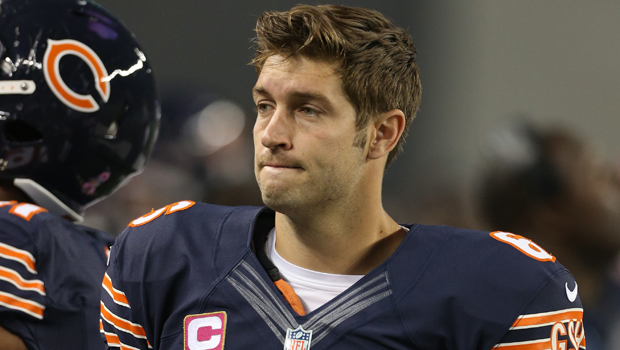The Public Struggles of a Quarterback with Type 1

Commentary
Shortly before the 2014 Super Bowl, the Chicago Bears of the NFL made a big splash by signing their starting quarterback, Jay Cutler, to a seven-year, $126.7 million contract. This contract was big news in the NFL. It was even bigger news in the Type 1 diabetes community than the sporting world, as Cutler has Type 1 diabetes, and has been active in the Type 1 community. A seven-year contract represented a huge bet that an athlete with Type 1 diabetes could not only stay healthy, but excel, in a physically brutal work environment.
Unfortunately, just a year later, that contract is looking like a bad deal for the Bears’ front office. During the 2014 regular season, Cutler put up disastrous numbers, throwing many interceptions and proving ineffective at leading the team’s shaky offense. Worse, his on-field demeanor, always considered a liability, has deteriorated. His team scuffled through a 5-11 season, and Cutler lost his starting quarterback job before the season ended.
Cutler’s troubles have generated a huge amount of headlines, and it is difficult to put a positive spin on his performance in a way that reflects well on Type 1 diabetes athletes, despite his philanthropic efforts. If Cutler were a third-string quarterback, he would be held up as an example for what Type 1 diabetes athletes can do. Fairly or unfairly, however, Cutler’s struggles are magnified in the public eye because he has such a prominent place in the game and because of his huge contract. When he struggles so mightily, it becomes difficult to hold him up as a poster child for Type 1 athletic accomplishment.
Surprisingly, while NFL analysts have discussed Cutler’s shortcomings at length, there seems to be no coverage regarding how Type 1 diabetes may be affecting him.
Such an omission is puzzling. At first glance, it would seem as if all the sports reporters and analysts had made an unwritten agreement not to delve into this part of Cutler’s life. At one time that would have been understandable; reporters regularly overlooked Babe Ruth’s philandering and Mickey Mantle’s alcoholism. But in today’s world, where national and local sports television networks need to provide fresh content 24-7, it is hard to imagine that there isn’t at least one reporter willing to speculate Type 1 diabetes as the reason for Cutler’s poor performance.
And as much as we in the Type 1 diabetes community would hate to admit it, it could be a legitimate storyline. Cutler’s on-field demeanor (crabbiness, spaciness, bad decision-making) are characteristic of someone who is either experiencing high or low blood sugars. Many other elite Type 1 athletes have discussed the constant tinkering they must do to maintain blood sugar levels. Even veterans of blood glucose level maintenance have turbulent times, so it wouldn’t be at all surprising if this is what was happening to Cutler.
This leaves news observers like myself with a mystery on our hands. How could reporters overlook such an obvious storyline?
The first theory is that maybe it’s only an obvious storyline to us. As members of the diabetes community are acutely aware, Type 1 is not a well-understood chronic condition (is it possible that there are no sports reporters with diabetes?). It’s possible that poor understanding of the condition has made it a non-story.
There’s also the possibility that sports reporters are too busy chasing the main storylines of Cutler’s demise (bad mechanics, personality issues, poor team construction) to pull at the storyline thread of his diabetes.
Finally, there’s also the possibility that reporters have tried to look into the diabetes angle and gotten nowhere. Perhaps team officials either think Cutler’s doing fine with his diabetes care or they don’t know enough about the condition to say much about it. In a recent interview with Insulin Nation, baseball player Sam Fuld says he has little direct communication with his trainers about his condition on a day-to-day basis; Cutler, who is often characterized as extremely private, might be exactly the same.
For whatever reason, Cutler’s failings on the field are not being laid at the altar of Type 1 diabetes. Still, that’s cold comfort for the Type 1 diabetes community as it watches one of its own struggle in the limelight.
Thanks for reading this Insulin Nation article. Want more Type 1 news? Subscribe here.
Have Type 2 diabetes or know someone who does? Try Type 2 Nation, our sister publication.







